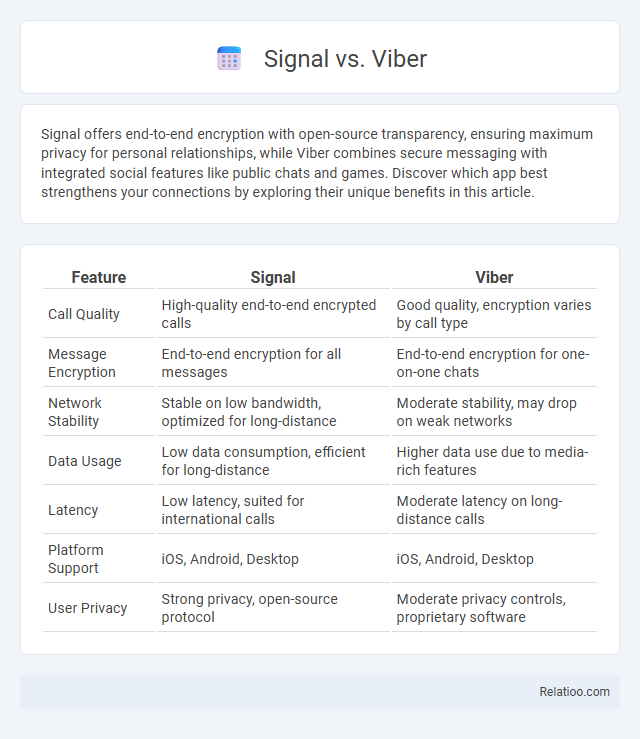Signal offers end-to-end encryption with open-source transparency, ensuring maximum privacy for personal relationships, while Viber combines secure messaging with integrated social features like public chats and games. Discover which app best strengthens your connections by exploring their unique benefits in this article.
Table of Comparison
| Feature | Signal | Viber |
|---|---|---|
| Call Quality | High-quality end-to-end encrypted calls | Good quality, encryption varies by call type |
| Message Encryption | End-to-end encryption for all messages | End-to-end encryption for one-on-one chats |
| Network Stability | Stable on low bandwidth, optimized for long-distance | Moderate stability, may drop on weak networks |
| Data Usage | Low data consumption, efficient for long-distance | Higher data use due to media-rich features |
| Latency | Low latency, suited for international calls | Moderate latency on long-distance calls |
| Platform Support | iOS, Android, Desktop | iOS, Android, Desktop |
| User Privacy | Strong privacy, open-source protocol | Moderate privacy controls, proprietary software |
Introduction to Signal and Viber
Signal and Viber are leading secure messaging applications known for their robust encryption technologies and user-friendly interfaces. Signal employs end-to-end encryption based on the open-source Signal Protocol, ensuring privacy and security for messages and calls, while Viber incorporates its own end-to-end encryption across chats and voice communications. Both platforms leverage advanced technology to provide seamless cross-platform messaging experiences with features such as group chats, multimedia sharing, and voice/video calls.
Key Features Comparison
Signal offers end-to-end encryption with open-source protocols ensuring maximum privacy, while Viber provides a broad range of features including group chats, stickers, and media sharing alongside encryption. Both platforms support voice and video calls, but Signal emphasizes minimal data collection and enhanced security settings such as disappearing messages and screen security. Your choice depends on prioritizing either Signal's strict privacy measures or Viber's versatile communication tools.
Security and Privacy Measures
Signal employs end-to-end encryption by default for all messages and calls, offering state-of-the-art security protocols that prioritize user privacy without storing metadata. Viber also uses end-to-end encryption on its platform but collects more user data, including phone numbers and contact lists, which can pose privacy concerns. Your choice between Signal and Viber should consider their differing approaches to data collection and encryption, with Signal being widely recognized for stronger privacy measures aligned with technology-driven security standards.
User Interface and Experience
Signal offers a minimalist and intuitive user interface focused on privacy, ensuring seamless encrypted messaging and calling with straightforward navigation. Viber incorporates a more vibrant and feature-rich design, providing users with stickers, public chats, and integrated games that enhance engagement but may overwhelm those seeking simplicity. Technology integration in both apps supports cross-platform synchronization and multimedia sharing, yet Signal prioritizes security protocols, while Viber emphasizes social interaction features that impact the overall user experience differently.
Platform Compatibility
Signal and Viber both offer robust platform compatibility, ensuring seamless communication across various devices. Signal supports iOS, Android, Windows, macOS, and Linux, providing end-to-end encryption on all platforms for enhanced privacy. Your choice should consider Viber's additional features on desktop and its integration with mobile networks, while Signal prioritizes security and cross-platform synchronization.
Voice and Video Call Quality
Signal offers end-to-end encryption with superior voice and video call quality, ensuring clear audio and low latency even on slower networks. Viber provides HD voice and video calls with noise reduction technology, supporting group video calls with up to 20 participants, enhancing communication for social and business use. Both utilize advanced codecs like Opus for audio and VP8/VP9 for video, but Signal's emphasis on privacy often results in less data compression, sometimes impacting call fluidity compared to Viber's optimized performance for diverse network conditions.
Group Chat and Collaboration Tools
Signal offers end-to-end encryption with robust privacy features for group chats, making it ideal for secure communication within collaborative teams. Viber supports rich group chat functionalities including multimedia sharing, voice, and video calls, providing versatile tools for enhanced team collaboration. Both platforms leverage advanced technology to facilitate seamless real-time communication, but Signal prioritizes security while Viber focuses on user-friendly collaboration features and social connectivity.
File Sharing and Media Support
Signal offers end-to-end encrypted file sharing supporting images, videos, and documents up to 100MB, ensuring privacy and security in media transmissions. Viber supports media sharing with file sizes up to 200MB, including photos, videos, and voice messages, integrated with stickers and GIFs for enhanced communication. Both platforms leverage advanced encryption technology but differ in maximum file size limits and multimedia feature sets, impacting user experience in secure media exchange.
Popularity and User Base
Signal, Viber, and other messaging platforms compete heavily in popularity, with Viber boasting over 260 million active users worldwide due to its extensive features and international reach. Signal attracts users prioritizing privacy and encryption, growing rapidly to surpass 40 million downloads amid increasing demand for secure communications. Your choice between these platforms depends on whether you value a vast user base or advanced security technology for messaging.
Which App Should You Choose?
Signal offers end-to-end encryption with open-source protocols, making it ideal for privacy-focused users seeking secure messaging and voice calls. Viber provides a broad ecosystem including group chats, multimedia sharing, and integrated public chats, appealing to those who want versatile communication features alongside strong encryption. Choose Signal for maximum security and minimal data collection, while Viber suits users seeking comprehensive functionality and a larger user base.

Infographic: Signal vs Viber
 relatioo.com
relatioo.com